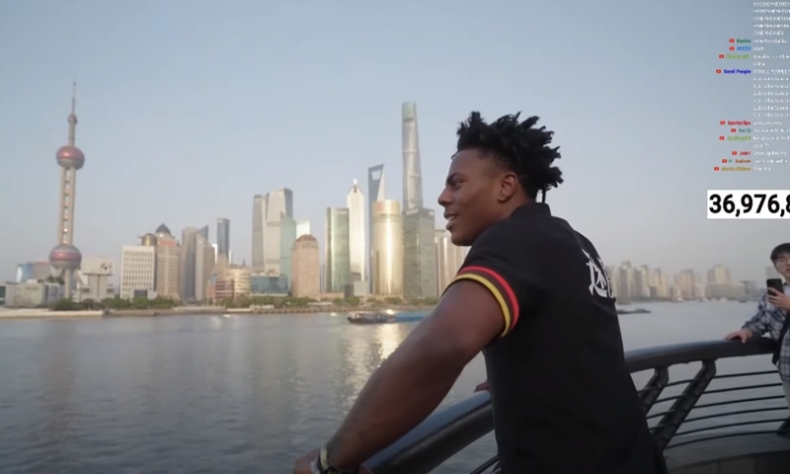When Truth Shatters Prejudice

When the real China is presented to more people, perhaps the cognitive wall separating the East and the West will eventually crumble in the face of this truth.
On March 24, Darren Watkins Jr., better known as IShowSpeed, a top American influencer with over 37 million YouTube subscribers, kicked off the China leg of his global tour. Over nearly two weeks, he and his team livestreamed from several Chinese cities, including Shanghai, Beijing, Zhengzhou, Chongqing and Hong Kong. Within the first week alone, cumulative global viewership surpassed 100 million.
Darren’s humorous video clips may have popped up on the social media feeds of many Chinese people, but before he arrived in China, few actually saw him as a celebrity. This, however, played to his advantage. With his unedited, immersive, single-take livestreams capturing authentic street scenes and everyday life in China, the spontaneity of his broadcasts had a natural persuasiveness—sharply contrasting with the carefully edited videos from many mainstream Western media outlets that seek to demonize China. In late February, France’s France 2 television channel, on its program Cash Investigation, fabricated a false report on “child labor in China” by selectively editing footage of a young girl sewing buttons. The program also misinterpreted a factory worker’s response. While the original undercover recording in Chinese remained audible, it was falsely translated as “recruiting Xinjiang workers and forcing them into labor.” The video was quickly deleted after it sparked controversy.
For a long time, due to ideological differences and self-inflicted geopolitical challenges, the Western elite, particularly in the United States, has cast a gray filter on China. Since many ordinary people do not have the opportunity to visit China firsthand, the main sources of information they rely on are mainstream Western media, which, over the past decade, have shaped a negative view of China. In April 2022, the Pew Research Center released a poll, in which 82 percent of 3,581 surveyed American adults held a negative view of China, with 40 percent expressing a very negative opinion, the highest since 2005.
To counter false propaganda, China has encouraged more people to visit and experience the country firsthand, enabling them to distinguish fact from fiction. After three years of strict border controls due to the COVID-19 pandemic, China introduced a series of policies in 2023 to attract international tourists including visa exemptions. According to the latest data from the National Immigration Administration of China, the number of foreign visitors entering without a visa reached 20.115 million in 2024, a 112.3-percent year-on-year increase.

Among those visitors, many have shared their travel experiences on social media. They’ve ridden high-speed trains at 350 km per hour, enjoyed street food at 2 a.m., filmed fully mechanized cotton fields in Xinjiang Uygur Autonomous Region with drones, and prayed alongside devout worshipers in Tibetan temples. These experiences not only showcase China’s ongoing progress in technology and social governance but also resonate deeply with viewers. A safe environment, convenient living and friendly relationships—these are universal aspirations for a happy life, and China is committed to turning this ideal into reality.
In addition to Darren’s livestreaming in China, another recent story between the Chinese and American publics has also gained attention. Earlier this year, in response to rumors that the U.S. Government might demand the shutdown of TikTok, a large number of American users began referring to themselves as “TikTok refugees” and registered accounts on China’s social media platform Xiaohongshu, or RedNote. Among them was Neumann Brecken from Mississippi, who shared a photo of himself with his 14-month-old daughter on RedNote, writing, “Hello everyone! This is myself and my daughter saying hello to all and look forward to all the new friends we make across the sea!” A mother from Shanghai responded by posting a photo of herself, her husband and their 19-month-old daughter shopping at a supermarket.
The two families, separated by the Pacific Ocean, began interacting, exchanging parenting tips and sharing daily life experiences. More than two months later, they met in Shanghai. While the parents were concerned that their children might have difficulty connecting due to the language barrier, the two babies immediately shared snacks with each other upon their first meeting and quickly became good friends.
In China, over 100 million people have been touched by this heartwarming story. Many have remarked, “Isn’t this how the world should be?” Sincerity and kindness are universal emotions that transcend national borders, races and cultures. When the real China is presented to more people, perhaps the cognitive wall separating the East and the West will eventually crumble in the face of this truth.
 Facebook
Facebook
 Twitter
Twitter
 Linkedin
Linkedin
 Google +
Google +










